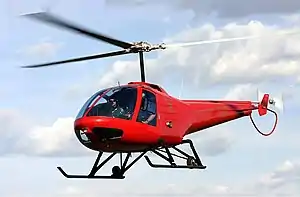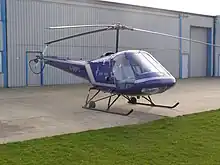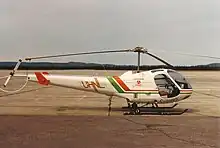Enstrom F-28
The Enstrom F-28 and 280 are a family of small, light piston engine powered helicopters produced by the Enstrom Helicopter Corporation.[1]
| F-28 / 280 | |
|---|---|
 | |
| Enstrom 280FX Shark | |
| Role | Light helicopter |
| Manufacturer | Enstrom Helicopter Corporation |
| Introduction | 1965 |
| Produced | 1965-2022 |
| Variants | Enstrom TH180 Spitfire Mark I |
| Developed into | Enstrom 480 |
Design and development
Since delivering their first helicopter shortly after Federal Aviation Administration type certification of the F-28 model in April 1965, Enstrom helicopter has produced, as of 2007, approximately 1,200 aircraft.[2]
The company produces three models, the F-28, the more aerodynamic 280 and the turbine-powered 480, each with their own variants. The F-28 and 280 both use Lycoming piston engines, virtually identical to those found in general aviation fixed-wing aircraft.[1]
Variants
F-28

- F-28
- Certified April 1965.[1][3]
- F-28A
- Initial production version. Certified May 1968.[1][3]
- T-28
- Turbine powered.[1]
- F-28B
- Turbocharged version.[1]
- F-28C
- Fitted with an upgraded engine with turbocharger, and a two piece windscreen. Certified 1975[1][3]
- F-28F Falcon
- Similar to F-28C with more powerful engine, improved turbocharger and addition of a throttle corellator. Certified December 1980[1][3]
- F-27F-P
- Police patrol version developed for the Pasadena Police Department (California). It is equipped with searchlights, FLIR and a public address system.
- Spitfire Mark I
- A turbine powered conversion by Spitfire Helicopters Inc.
- Spitfire Mark II Tigershark
- A turbine powered conversion by Spitfire Helicopters Inc.
280

- 280 Shark
- Certified September 1975.[1]
- 280C Shark
- Aerodynamically refined version of the F28C-2, equipped with an upgraded engine, fitted with a turbocharger. Certified 1975[1]
- 280L Hawk
- Stretched cabin four-seat version, first flying in December 1968. Development halted due to lack of funds.
- 280F
- Similar to 280C with more powerful engine, improved turbocharger and addition of a throttle correlator. Certified December 1980[3]
- 280FX
- Based on the 280F with landing gear fairings, redesigned air intakes on top of the cabin and a redesigned and relocated horizontal stabilizer with vertical end plates. Certified in January 1985[3]
Operators
Civil operators
The aircraft is operated by a large number of small commercial and flight training operators, most operating one or two aircraft.
Military and government operators

- Colombian Air Force - 12 F-28F trainers delivered 1994.[6]
Accidents and incidents
- On 22 October 1986, an Enstrom F-28F Falcon suffered a mechanical failure at an altitude of 75 feet (23 meters) over Manhattan in New York City due to the installation of an improper clutch, struck a fence, and crashed into the Hudson River during a traffic report by WNBC 660 AM radio flying traffic reporter Jane Dornacker. The broadcast captured her shouting "Hit the water! Hit the water! Hit the water!" as the helicopter went down. The pilot survived with serious injuries, but Dornacker died on the way to the hospital.[11]
- On 26 January 2015, an Enstrom 280FX crashed at Erie, Colorado, following the separation of its main rotor blades, killing both the student and instructor on board. The accident was caused by a failure of the main rotor spindle as a result of a crack. The accident resulted in the issuance of an Emergency Airworthiness Directive (AD) by the United States Federal Aviation Administration on 12 February 2015 grounding more than 300 helicopters. The AD requires a magnetic particle inspection to detect cracks in the main rotor spindle in aircraft with more than 5,000 hours and requires replacing the spindle if cracked.[12]
Specifications (F28F)
Data from Brassey's World Aircraft & Systems Directory[13]
General characteristics
- Crew: one
- Capacity: two passengers
- Length: 29 ft 3 in (8.92 m)
- Height: 9 ft 0 in (2.74 m)
- Empty weight: 1,570 lb (712 kg)
- Max takeoff weight: 2,600 lb (1,179 kg)
- Powerplant: 1 × Lycoming HIO-360-F1AD four-cylinder, direct-drive, horizontally opposed, air-cooled, piston aircraft engine, 225 hp (168 kW)
- Main rotor diameter: 32 ft 0 in (9.75 m)
- Main rotor area: 804 sq ft (74.7 m2) NACA 0013.5[14]
Performance
- Maximum speed: 97 kn (112 mph, 180 km/h)
- Cruise speed: 89 kn (102 mph, 165 km/h)
- Range: 241 nmi (277 mi, 446 km)
- Service ceiling: 12,000 ft (3,700 m)
- Rate of climb: 1,450 ft/min (7.4 m/s)
See also
Related development
Aircraft of comparable role, configuration, and era
References
- Apostolo, Giorgio: The Illustrated Encyclopedia of Helicopters, pages 64-65. Bonanza Books, New York, 1984. ISBN 0-517-43935-2
- Rotorspot.nl: Enstrom Production List Archived 2010-10-28 at the Wayback Machine
- FAA Type Certificate
- "World's Air Forces 1990 pg. 41". flightglobal.com. Retrieved 7 March 2013.
- "Ejercito de Chile 280FX". Retrieved 7 March 2013.
- Forster World Air Power Journal Autumn 1997, p. 134
- "World Air Forces 2021". FlightGlobal. 4 December 2020. Retrieved 5 January 2021.
- "World_Air_Forces_2013" (PDF). Flightglobal Insight. 2013. Retrieved 10 March 2013.
- "California, Pasadena Police Department Air Operations". policehelicopterpilot.com. Retrieved 7 March 2013.
- "World Air Forces 2018". Flightglobal Insight. 2018. Retrieved 4 August 2018.
- planecrashinfo.com Famous People Who Died in Aviation Accidents: 1980s
- Kauh, Elaine (13 February 2015). "FAA Issues Emergency AD For Enstrom Helicopters". AVweb. Retrieved 16 February 2015.
- Taylor, M J H, ed. (1999). Brassey's World Aircraft & Systems Directory 1999/2000 Edition. Brassey's. ISBN 1-85753-245-7.
- Lednicer, David. "The Incomplete Guide to Airfoil Usage". m-selig.ae.illinois.edu. Retrieved 16 April 2019.
Bibliography
- Federal Aviation Administration Type Certificate No.H1CE
- Elliott, Bryn (May–June 1999). "On the Beat: The First 60 Years of Britain's Air Police, Part Two". Air Enthusiast (81): 64–69. ISSN 0143-5450.
- Foster, Peter R. (Autumn 1997). "Air Power Analysis: Part One: Columbia, Ecuador, French Guyana, Guyana, Peru, Surinam and Venezuela". World Air Power Journal. Vol. 30. pp. 132–157. ISBN 1-86184-004-7. ISSN 0959-7050.